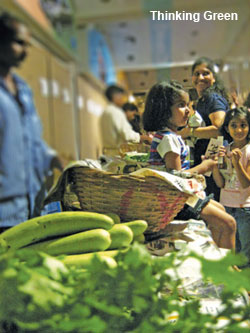On 10-10-10, I make my way to Mumbai’s Farmers’ Market, which has come to Cuffe Parade’s World Trade Centre for the first time. In its first superhit season six months ago, the market was a permanent fixture every Sunday in Bandra, located inside the small Nilgiri Garden on Linking Road. This season, they have decided to travel week after week, to spread their message to snobbish townies, as well as distant suburbanites.
Flamboyante, the venue for the market, is more of a mela than a market, when I arrive. Right at the entrance, I am greeted by the smiling faces of Maharashtra’s organic farmers. They have travelled right through the night with their produce and set up shop here early morning, but there is no hint of tiredness on their faces. I see them chatting with the customers, educating them about ripening techniques, and lovingly packing their fruits and vegetables into their waiting cloth bags. “Please buy some,” Kavita Mukhi, the market’s organiser, urges me, as I bite into an amla so tart that it sends an electric current throughout my body. “We want the farmers to make a healthy living so that their next generation will want to become farmers. If not, where will our food come from?”
There is no middleman today and that is what makes it exciting for the farmers and the city people like us, many of whom have never seen a farmer up close and personal in their entire life. After being bombarded with media stories about farmer suicides or seeing ironic depictions in films like Peepli Live, the normalcy of the farmers I encounter is a pleasant surprise. Yet, it is a fragile situation. As Mukhi tells me, “The government’s policies, pesticides, and genetically modified seeds are all very bad for them. Also, what finally reaches the city markets can be priced at up to ten times what the middleman paid, and the farmer is often forced to sell at whatever price he is offered because his produce is so perishable. All this needs to change.”
In this context, the farmers’ enthusiasm needs to be saluted. Their desire to travel, to showcase their wares, to come and engage with us city-bred brats, who might, after all that they’ve gone through, still raise our eyebrows and slyly try and bargain with them, is as praiseworthy as their commitment to organic farming.
I walk into the central courtyard of Flamboyante – the giant tree there has been decorated with lights and marigold flowers and there are stalls all around. The café is packed with SoBo folks enjoying their Sunday brunch. The ‘organic’rita pizza looks delicious. A team of children from the Jalebi Ink youth media collective is distributing copies of their newspaper Junknama to all visitors.
I saunter over to say ‘Hi’ to macrobiotic diet expert Shonali Sabherwal and learn more about her dabba delivery service. Then, after buying a glass of refreshing Mint Cooler from a savvy Cuffe Parade housewife, I am distracted by the fabulous daughter-in-law and mom-in-law tag team that make up Kika – a baby food that can also be used to make adult pudding! Their joint charm ensures that I pick up a box. The cheerful Mulshi Springs water folks call me over for a taste of some refreshing pesticide-free water, bottled at a Maharashtra spring, in an elegant glass bottle. At 50 bucks a bottle, it seems like a pretty good deal. Sorry Evian, I’m switching loyalties!
This is the ultimate luxury, I think to myself. To form a direct relationship between yourself and those who grow your food, something that is becoming more and more rare as urbanisation increases. To actually talk to the person who is growing, or making your food. To know what is inside your food. To respect the earth. Once upon a time, all this used to be a way of life in this country. Remembering this and acting upon it, is a luxury, which in fact, needs to be a necessity.
* This post is a modified version of my column Parmesh’s Viewfinder which appears in Verve magazine every month.

